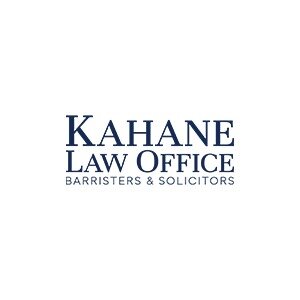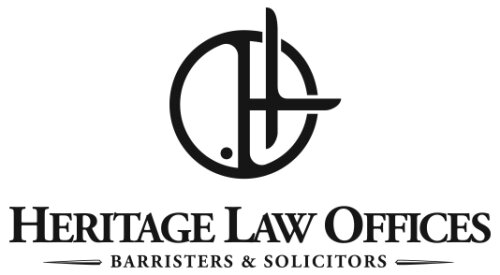Best Energy Regulatory Law Lawyers in Edmonton
Share your needs with us, get contacted by law firms.
Free. Takes 2 min.
List of the best lawyers in Edmonton, Canada
About Energy Regulatory Law in Edmonton, Canada
Energy Regulatory Law in Edmonton, Canada, encompasses the legal frameworks and regulations governing the development, distribution, and consumption of energy resources. Edmonton, as Alberta's capital and a central hub for Canada's oil and gas industry, is subject to provincial, federal, and municipal regulations. This area of law is focused on the compliance, permitting, environmental assessments, licensing, land use, and rates related to energy projects such as oil, gas, pipelines, renewable energy, and utilities. Energy Regulatory Law ensures protection of public interests, promotes environmental responsibility, and manages interactions between energy producers, consumers, regulators, and other stakeholders.
Why You May Need a Lawyer
Engaging a lawyer with experience in Energy Regulatory Law can be critical for several reasons. Common situations where legal help is necessary include:
- Applying for or renewing licenses and permits for energy projects
- Compliance with provincial and federal energy regulations
- Environmental impact assessments and navigating environmental regulations
- Resolving disputes between landowners and energy companies regarding land use, rights of way, or compensation
- Negotiating contracts for energy production, transmission, or distribution
- Participating in regulatory hearings or appeals before boards such as the Alberta Utilities Commission or the Canada Energy Regulator
- Addressing Indigenous consultation and duty to consult requirements for project approvals
- Dealing with liability or enforcement actions from regulatory bodies
- Structuring transactions or joint ventures in the energy sector
- Interpreting changes in energy legislation, policies, or market rules
A knowledgeable legal professional can help you understand your rights and obligations, reduce risks, and navigate complex regulatory procedures.
Local Laws Overview
Energy Regulatory Law in Edmonton is influenced primarily by Alberta’s provincial legislation, with oversight from both federal and provincial bodies. Key legal aspects include:
- Alberta Energy Regulator (AER): Oversees the development of Alberta's energy resources, including oil, natural gas, oil sands, and coal, ensuring they are developed safely, efficiently, and in an environmentally responsible manner.
- Alberta Utilities Commission (AUC): Regulates the province's utility sector, including electricity and natural gas utilities, transmission, distribution, and rates.
- Canada Energy Regulator (CER): Manages the interprovincial and international aspects of pipelines, powerlines, and offshore energy projects.
- Land Titles and Surface Rights: Alberta has specific rules for land access, compensation, and environmental protection related to energy development. The Surface Rights Board helps resolve disputes between landowners and companies.
- Environmental Laws: Activities with environmental impacts require approval under provincial and sometimes federal statutes, such as the Environmental Protection and Enhancement Act and the federal Impact Assessment Act.
- Municipal Bylaws: Edmonton has local guidelines affecting energy projects, especially regarding land use, zoning, and urban development.
Understanding the interplay of these laws and regulatory bodies is essential to ensuring compliance and protecting interests in energy matters.
Frequently Asked Questions
What is Energy Regulatory Law?
Energy Regulatory Law is a branch of law that covers the rules and regulations governing energy production, distribution, consumption, and market operations, as well as related environmental and land use concerns.
Who regulates energy projects in Edmonton?
The Alberta Energy Regulator (AER) regulates most in-province oil and gas operations, while the Alberta Utilities Commission (AUC) oversees utilities. Projects crossing provincial or national borders are regulated by the Canada Energy Regulator (CER).
Do I need approval for a new energy project?
Most energy projects require some form of regulatory approval. The requirements depend on the type, location, and scope of the project. Laws often mandate environmental assessments and permits before starting operations.
How are landowners affected by energy development?
Landowners may be approached for access to their land for energy development. They are entitled to compensation and have rights protected under Alberta's Surface Rights Act, but may need legal help to ensure their interests are protected.
What happens if there is an environmental impact?
If energy development causes environmental harm, companies may face investigations, penalties, or restoration orders. Regulatory bodies closely monitor compliance, and legal advice may be needed to address enforcement actions.
What are my responsibilities as an energy producer?
Producers must comply with laws regarding safe operations, environmental standards, reporting, Indigenous consultation, and conditions set out in regulatory approvals. Non-compliance can result in severe penalties and liability.
How are disputes between energy companies and landowners resolved?
Disputes can be mediated or arbitrated, often before the Surface Rights Board. Legal representation can help protect your rights and negotiate fair settlements.
Are renewable energy projects regulated differently?
While some regulations overlap, renewable energy projects like solar or wind farms may be subject to unique permitting, land use, and environmental assessment requirements. Municipal zoning and provincial policies will also apply.
Do Indigenous consultation duties apply to energy projects?
Yes, both federal and provincial laws may require meaningful consultation with Indigenous communities if projects may affect their rights or traditional lands. Proper procedure is mandatory to avoid legal challenges.
How can a lawyer help with regulatory compliance?
A lawyer can assess your operations, identify required licences and permits, help you understand legal obligations, represent you in hearings, and respond to regulatory investigations or enforcement actions.
Additional Resources
There are several resources and organizations in Edmonton and Alberta that can provide information or assistance related to Energy Regulatory Law:
- Alberta Energy Regulator (AER)
- Alberta Utilities Commission (AUC)
- Canada Energy Regulator (CER)
- Surface Rights Board of Alberta
- Alberta Ministry of Energy
- Edmonton city government planning and development offices
- Canadian Bar Association - National Energy, Environment and Resources Law Section
- Canadian Energy Law Foundation (CELF)
- University of Alberta Faculty of Law - Energy Law Research
These bodies provide guidance, publications, and may answer basic regulatory questions or direct you to qualified legal professionals.
Next Steps
If you think you need assistance with Energy Regulatory Law in Edmonton, consider the following steps:
- Gather relevant documents and details about your situation, such as permits, correspondence, and contracts
- Define your primary concerns or questions to communicate clearly with a legal professional
- Consult regulatory resources to understand applicable approvals or requirements
- Contact a lawyer or law firm with experience in Edmonton’s energy sector and regulatory matters
- Set up an initial consultation to review your case and explore your options
- Follow any legal advice to ensure compliance, protect your interests, or avoid pitfalls in project planning and operations
A qualified lawyer can make navigating complex regulatory environments much smoother, reduce risk, and offer peace of mind as you pursue your objectives in Edmonton's energy sector.
Lawzana helps you find the best lawyers and law firms in Edmonton through a curated and pre-screened list of qualified legal professionals. Our platform offers rankings and detailed profiles of attorneys and law firms, allowing you to compare based on practice areas, including Energy Regulatory Law, experience, and client feedback.
Each profile includes a description of the firm's areas of practice, client reviews, team members and partners, year of establishment, spoken languages, office locations, contact information, social media presence, and any published articles or resources. Most firms on our platform speak English and are experienced in both local and international legal matters.
Get a quote from top-rated law firms in Edmonton, Canada — quickly, securely, and without unnecessary hassle.
Disclaimer:
The information provided on this page is for general informational purposes only and does not constitute legal advice. While we strive to ensure the accuracy and relevance of the content, legal information may change over time, and interpretations of the law can vary. You should always consult with a qualified legal professional for advice specific to your situation.
We disclaim all liability for actions taken or not taken based on the content of this page. If you believe any information is incorrect or outdated, please contact us, and we will review and update it where appropriate.











